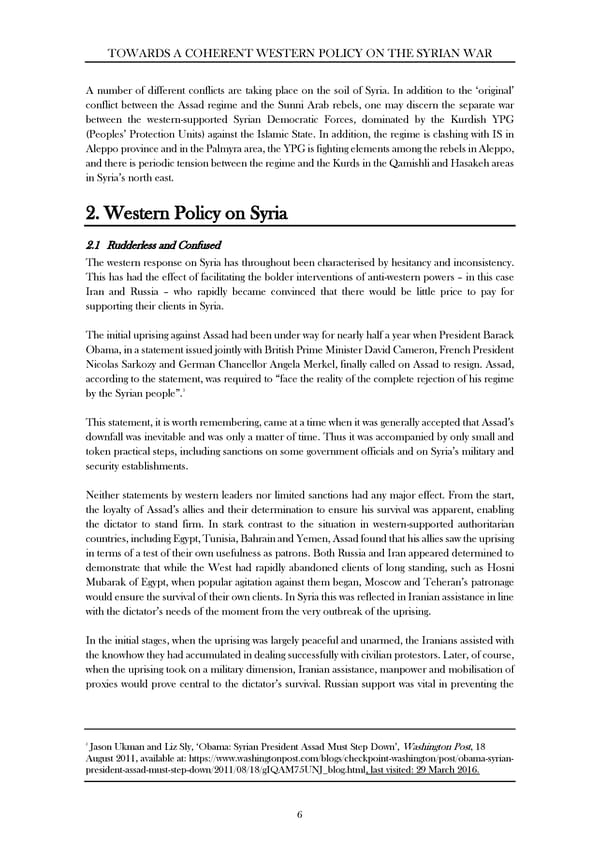TOWARDS A COHERENT WESTERN POLICY ON THE SYRIAN WAR A number of different conflicts are taking place on the soil of Syria. In addition to the ‘original’ conflict between the Assad regime and the Sunni Arab rebels, one may discern the separate war between the western-supported Syrian Democratic Forces, dominated by the Kurdish YPG (Peoples’ Protection Units) against the Islamic State. In addition, the regime is clashing with IS in Aleppo province and in the Palmyra area, the YPG is fighting elements among the rebels in Aleppo, and there is periodic tension between the regime and the Kurds in the Qamishli and Hasakeh areas in Syria’s north east. 2. Western Policy on Syria 2.1 Rudderless and Confused The western response on Syria has throughout been characterised by hesitancy and inconsistency. This has had the effect of facilitating the bolder interventions of anti-western powers – in this case Iran and Russia – who rapidly became convinced that there would be little price to pay for supporting their clients in Syria. The initial uprising against Assad had been under way for nearly half a year when President Barack Obama, in a statement issued jointly with British Prime Minister David Cameron, French President Nicolas Sarkozy and German Chancellor Angela Merkel, finally called on Assad to resign. Assad, according to the statement, was required to “face the reality of the complete rejection of his regime by the Syrian people”.5 This statement, it is worth remembering, came at a time when it was generally accepted that Assad’s downfall was inevitable and was only a matter of time. Thus it was accompanied by only small and token practical steps, including sanctions on some government officials and on Syria’s military and security establishments. Neither statements by western leaders nor limited sanctions had any major effect. From the start, the loyalty of Assad’s allies and their determination to ensure his survival was apparent, enabling the dictator to stand firm. In stark contrast to the situation in western-supported authoritarian countries, including Egypt, Tunisia, Bahrain and Yemen, Assad found that his allies saw the uprising in terms of a test of their own usefulness as patrons. Both Russia and Iran appeared determined to demonstrate that while the West had rapidly abandoned clients of long standing, such as Hosni Mubarak of Egypt, when popular agitation against them began, Moscow and Teheran’s patronage would ensure the survival of their own clients. In Syria this was reflected in Iranian assistance in line with the dictator’s needs of the moment from the very outbreak of the uprising. In the initial stages, when the uprising was largely peaceful and unarmed, the Iranians assisted with the knowhow they had accumulated in dealing successfully with civilian protestors. Later, of course, when the uprising took on a military dimension, Iranian assistance, manpower and mobilisation of proxies would prove central to the dictator’s survival. Russian support was vital in preventing the 5 Jason Ukman and Liz Sly, ‘Obama: Syrian President Assad Must Step Down’, Washington Post, 18 August 2011, available at: https://www.washingtonpost.com/blogs/checkpoint-washington/post/obama-syrian- president-assad-must-step-down/2011/08/18/gIQAM75UNJ_blog.html, last visited: 29 March 2016. 6
 Towards A Coherent Policy On The Syrian War Page 7 Page 9
Towards A Coherent Policy On The Syrian War Page 7 Page 9